Introduction
Organisation behaviour is the application and study of knowledge about how person act in an company. A particular person have various values, personality, perception, and learning which have impact on their performance within team (What is organizational behaviour?, 2017). It is important that top authority should organise the process of prediction, understanding, changing and maintaining behaviour of employees. Along with this, it also help workers to work within group in order to make proper use of resources. In this report, A David & Co Ltd is the chosen organisation. It is a medium seized organisation within UK. This firms gives bakery items, fresh vegetable and fruits and prepare products for their customers. Likewise, it deliver these products in schools, restaurant, hotels and many more according to their demands. This report involves company's power, culture and politics on an team and individual performance. They will also use motivation techniques and theories which will aid in meeting organisational targets. Along with this, also implement philosophies as well as concepts of organisation behaviour within business.
TASK 1
P1 Organisation power, politics and culture influence team and individual performance and behaviour
In a firm, there are several elements like power, culture and politics which have influence on behaviour and working of particular person and group members. It is important for management to give positive atmosphere at workplace and culture to employees. It will help in executing enterprise activities properly. Therefore, politics and power are two tactics which gave negative impact on functioning of subordinates.
Organisation's culture: This involve assumptions, values and beliefs which determine behaviour of particular person within company. Management of A David & Co Limited need to consider this element in order to inspire and dedicate employees towards their responsibilities. In this, Handy’s typology of culture consists four divisions which gave impact on team and individual behaviour and performance (Handy's Model of Organisational Culture, 2018). It is used by top authority of A David & Co Ltd which are as follows:
- Power culture: In this element, some companies give powerto few individuals for taking decisions. They do not involve staff members in process of decision making. Managers assign works to their employees in order to accomplish goals within span of time. As per David & Co Ltd, higher authorities do not share their powers with employees as they have to make decisions timely. Hence, firms give some power to workers for taking decisions related to their work for meeting business objectives and targets as well.
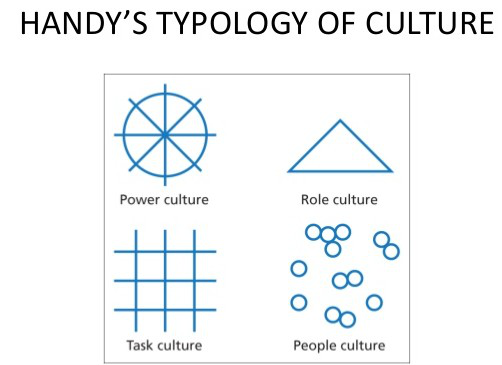
(Source: Handy’s typology of culture, 2017)
- Role culture: This is another part of culture. Here,management distribute responsibilities and roles to employees as per their knowledge and skills (Boxall, Guthrie and Paauwe, 2016). It will assist top authority to make proper use of manpower by giving them work according to their capabilities. In A David & Co Ltd, staff members execute their work properly and willingly accept challenges. It is due to managers assign them task as per their interest and qualification.
- Person culture: In this, it define that employees are having perception that they are very essential part of organisation. It will gave impact on functioning of A David & Co Ltd, as particular person need to achieve their personal targets. Workers perform works for earning money and they are not having determination to meet enterprise objectives. Hence, it is management duty to inspire workers and make them dedicated towards their duties.
- Task culture: In this, the management make teams in order to complete their goals within given period of time (Bedarkar and Pandita, 2014). It will assist managers to solve issues as well as make proper utilization of resources by using this tactic. A David & Co Ltd is running their business at medium scale in which employees are divided into groups as per their abilities and skills. It will assist management to run its enterprise operations in an appropriate way. Through this, it will help in delivering quality and fresh food products to their customers.
In A David & Co Ltd, management follow task culture in order to achieve goals and objectives. Workers are divided into groups, so that enterprise can run their activities appropriately. It will help in giving quality of goods to their buyers. Along with this, it also assist higher authority to make proper use of resources effectively by influencing group members performance and behaviour as well.
Organisation politics: In this tactic, it involve activities which are operated within company in order to achieve uncertain objectives of business. Here, management utilize their power to influence and direct workers performance (Burrell and Morgan, 2017). A David & Co Ltd, employees are having different beliefs, interest and value which are driving force of politics within organisation. It is important for manager to manage politics within company in order to balance power within employees and top authorities. Hence, uncertainties and contingencies in system are removed from it.
For A David & Co Ltd, politics are negative for its functionality as workers need to work as per its interest. In this, if management will play politics it will increase the chances of complexities and uncertainties. It will gave impact on individual and team performance and behaviour. Positive politics impacts effectively on individual as well as team-members. As if top management of company conveys every major information directly to the employees then it will not make employees curious about detail. And they will focus more appropriately on their work. It will improve productivity. Negative politics discourages employees and reduces their productivity as they are not able to perform in unethical working environment. In this, employees spends more time in gossips which declines productivity level.
Organisation's power: It is an another aspect which define person's capabilities to direct work and behaviour of others. There are various parts of power like reward, legitimate, expert, coercive and so on which are selected by management for achieving companies objective. Higher authority delegate their authorities to manager and employees in order to run functions smoothly. It is important for workers to achieve targets and work within given span of time. Therefore, power involve both negative as well as positive impact on team and individual performance.
A David & Co Ltd management is using reward power which provides manager to give reward to its employees in order to retain them for a long duration. Workers are given incentives, salary and so on for their results and work. This help in motivating employees to perform work within groups in order to accomplish goals timely. Likewise, employees are involved in the process of decision making which help management to formulate effective judgements and policies. They also provide rewards for their better performance as it will help in raising morale for performing work more appropriately. Along with this, manager can delegate their powers to employees who gives their best to the company. Thus, power gave positive impact on task of an team and individual. As it will help in inspiring and motivating workers to work hard for the organisation in an effective way. Whereas, organisation power also have negative impact over employees as if individuals who owns power misuses it, then it will demotivate other staff. As a result productivity of company decline.
TASK 2
P2 Motivation theories and techniques help in achieving organisational goals
Motivation is a psychological, social or biological state that drive people towards particular action (Christina and et. al., 2014). It is very essential activity which is used by manager to inspire workers in order to perform their work in an effective way. For this, it is important that manager should analyse the wants and desire of particular person. Therefore, it will help workers to accomplish their task within given time period. Along with this, it will assist subordinates to achieve their goals and objectives of business. There are two types of theories and having several sub parts which are as follows:
Content theory: In this, they mainly concentrate on 'what motivates human behaviour'. It is also known as needs theory, as manager of A David & Co Ltd tries to find out what are the requirements and then inspire and motivate employees for achieving their set goals and targets. Some of content theories are given below:
Maslow hierarchy of needs
This theory is shown in a pyramid shape in which most typical requirements are at the top level and basic needs are at the bottom level. This level of requirements is presented in the hierarchy. A David & Co Ltd can also apply this theory in order to increase its productivity. This theory consists:
- Physiological needs: It consists the basic requirements of employees to survive within the organisation. For example: food, air, water, shelter and many more. It is one of the most dominant needs.
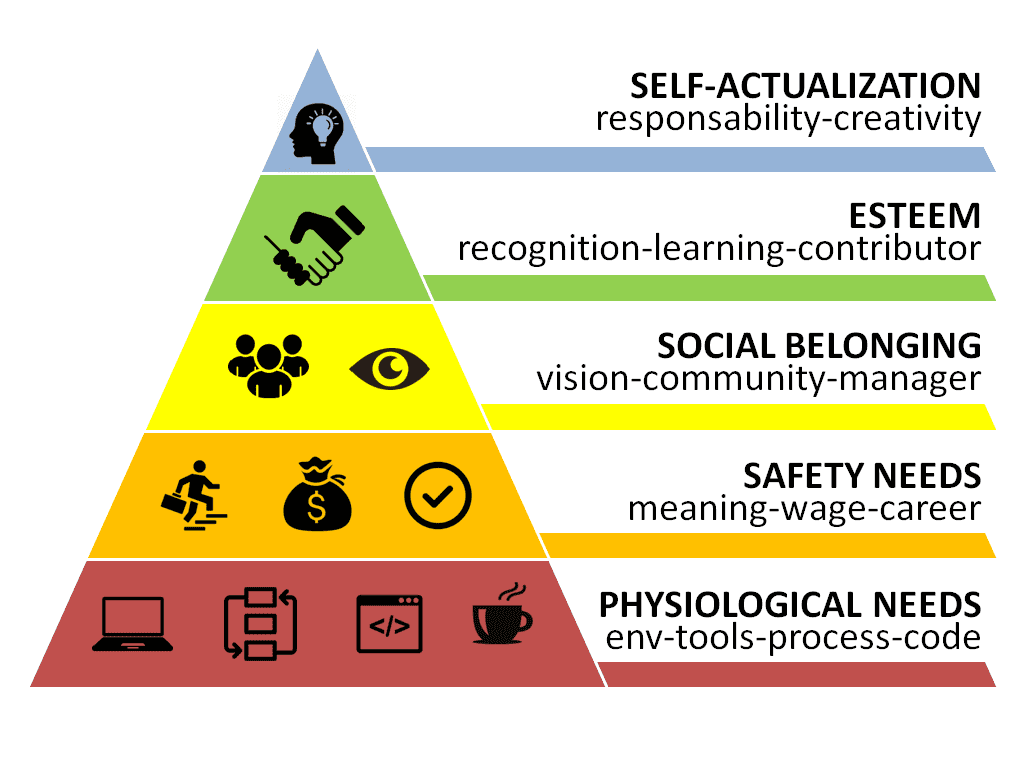
(Source: Maslow hierarchy of needs, 2018)
- Safety needs: If physiological requirements are fulfilled then it give rise to safety needs. As A David & Co Ltd have to develop safe environment with protection or safety in order to make them feel that they are working in secure work place.This need involve personal security, well-being and health, illness and many more.
- Social Belonging: After satisfying with safety needs it appear the requirements of belongingness and love (Coccia, 2014). Here, depends on pressure and power of peer group is a need for social belonging. This consists loneliness, social isolation, nervousness and so on.
- Self-esteem: This refers to appreciated, valued and respected by others. This is also categorised in two version like higher and lower. This include: freedom, self-confidence, status etc.
- Self-actualization: This need reflects an particular person desire to develop and grow their potential. Employees of A David & Co Ltdprefer creative tasks, opportunities, challenging position and so on. It include responsibility, creativity etc.
Alderfer- ERG theory
This theory is distinguished within three classes of requirements like existence, relatedness and growth. In this, both Alderfer and Maslow tries to describe how these stages, needs become less or more important to employees (Gabriel and et. al., 2015). A David & Co Ltd can also apply this theory to inspire their workforce in an positive way. This Alderfer theory involve:
- Existence needs: This involve requirement for basic necessities things. This theory involve physical safety and physiological needs. A David & Co Ltd have to fulfil employees needs.
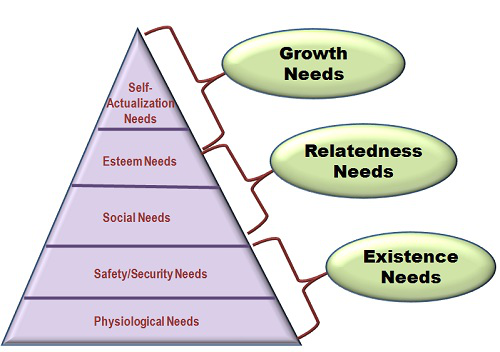
(Source: Alderfer- ERG theory, 2018)
- Relatedness needs: In this term, employees of A David & Co Ltdrequire significant relations like supervisors, family, peers etc. Along with this also need belongingness and love which strive towards reaching recognition and public frame.
- Growth needs: It is requirement for personal growth, advancement and self-development class of need. A David & Co Ltd alsoconsists needs of self-actualization as well as internal components of self esteem within their workplace.
Process theory: This theory focus on How employees can be motivated. This models mainly concentrates on the process of psychological that impacts on employees motivation (Hashim and Wok, 2014). A David & Co Ltd can inspire their employees by using this theories which are:
Vroom expectancy theory
This theory is developed by Victor H. Vroom. It define that workers get inspired if they are having knowledge that enterprise targets can be meet through their actions. Some of several factors like skills, knowledge, personality, abilities and experience will gave impact on workers behaviour and working within groups. Hence, A David & Co Ltd can also use the variable of this theory are as follows:
- Expectancy:In this factor, employees mainly belief in working hard and putting efforts for gaining success of set outcomes. In this, A David & Co Ltd employees will give their best performance within business. This is based on self-efficiency, abilities and so on.
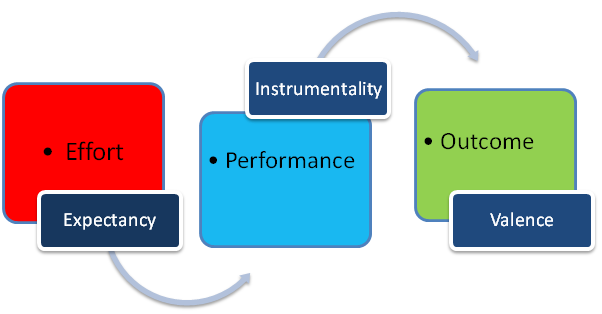
(Source: Vroom expectancy theory, 2017)
- Instrumentality: The workers belief that there is a link within targets and activities (Kinicki and et. al., 2014). If employees of A David & Co Ltd will give their best then they will get the rewards. It will help in increasing higher level of productivity as well.
- Valence: In this, it is a degree to which a people give value to rewards, outcomes of success. Here, it depends on mark, performance etc. of employees.
In this, manager of A David & Co Ltd is applying Maslow hierarchy of needs in order to inspire and motivate their employees. In this, they analyse the wants and needs of every workers so that they can motivate them accordingly. This ensures that employee perform assigned work in effective manner and achieve targeted goals and objectives in order to receive desired rewards. This will assist in increasing performance and productivity level of all employees within the enterprise. Along with this, it also help in maintaining positive workplace. As a result, goals of A David & Co Ltd will be accomplished in the less time with appropriate quality. It directly contributes in growth of the company.
TASK 3
P3 Effective team as opposed to an ineffective team
Team
Team consists of two or more persons which work within a group for achieving a common target (Kitchin, 2017). It will assist organisation to integrate various perception and skills of employees for working appropriately. In A David & Co Ltd, manager make groups which help them in making a proper use of resources in an effective way. Hence, higher authority can easily meet enterprise objectives by the help of teamwork.
Effective team
In an organisation, importance of team work help in improving quality as well as accomplish the project within given span of time. It is essential that groups members should have strong skills of communication. This will assist employees to inform their managers about their problems and opinions which are linked with their task. A David & Co Ltd, manger organise meeting as well as include employees for updating with modifications made in strategies and system. Management keep on updating workers about their targets which they need to achieve by them. Likewise, instruction and guidance are provided to keep group members motivated as well as dedicated towards their responsibilities.
Ineffective team
In this, team are not effective if employees are not having purpose and aim which help in accomplishing their work effectively (Limpanitgul, Boonchoo and Photiyarach, 2014). Management of A David & Co Ltd mainly concentrate on determining workers coordination and functioning within themselves.
Therefore, manager of A David & Co Ltd need to establish effective groups for running enterprise functions properly. In this, model of Tuckman's team development is used to make groups as well as maintain coordination among each other. Hence, workers perform works in an appropriate way which assist higher authorities in achieving objectives and goals.
Tuckman's team development model: These steps are organised by higher authority of A David & Co Ltd to build an effective team which are as follows:
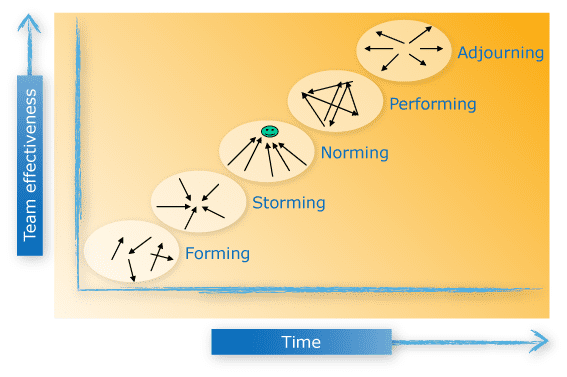
(Source: Tuckman's team development model, 2018)
- Forming:First step is organised by manager of A David & Co Ltd to build a group by distributing employees as per their knowledge and abilities (Maitland, Hills and Rhind, 2015).
- Storming: Then, it is important work for A David & Co Ltd higher authority to make employees ready to accomplish their task within team. Through this, all group members are acknowledged and introduced with one another in order to work properly.
- Norming: Supervisor make employees feel essential part of group. It will assist in increasing workers motivation and morale them to achieve their targets within time.
- Performing: In A David & Co Ltd, supervisor make workers work within groups for providing higher quality of products and beverages to their buyers.
- Adjourning: At last, it involve the process of assessment which is run by management to have performance information of employees. It will assist to make modifications within plan in order to accomplish enterprise targets.
Belbin's model of teamwork: This concepts is developed by Dr. Meredith Belbin. In this, groups help in getting success when employees are having different behaviours within team (Manzi and Darcy, 2017). It is important that all nine roles of team are assessed by manager while making teams. In this, every particular person weaknesses and strength are evaluated which assist them in building a effective team. Hence, there are various constraints of model are as follows:
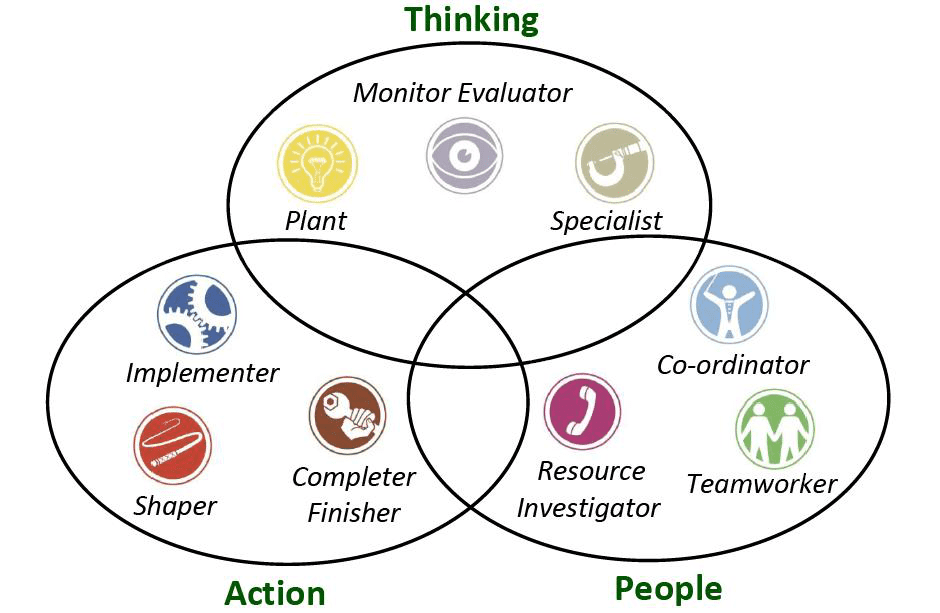
(Source: Belbin's model of teamwork, 2017)
- Plant: Manager of team need to be a creative thinker which assist them to apply unique as well as innovative technologies within system. It will aid manager of A David & Co Ltd to get over with all issues and provide fresh food products to buyers.
- Resource investigator: Manager of A David & Co Ltd need to make proper use of manpower, funds and materials for executing functions in an appropriate way. In this, manager also maintain linked with employees and connection with other person within organisation.
- Co-ordinator: In this, it also need to posses talent in order to make proper use of employees talent in order to perform work within group. In this, supervisor delegate task to trusted employees in order to motivate them towards their responsibilities.
- Shaper: Higher authority of A David & Co Ltd build team in order to accomplish their enterprise objective and goals within given time period (Mesu, Sanders and Riemsdijk, 2015).
- Monitor evaluator: It is very important role, manager have to assess workers working in order to get knowledge of employees abilities by analysing their results.
- Teamworker: In this, group members need to maintain strong relation and harmony with one another. It is essential that manager evaluate problems and disputes to give them appropriate solution.
- Implementer:Higher authority make strategies and plan which help in executing operations in an proper way.
- Completer finisher: In this, manager of A David & Co Ltd enhance enterprise activities by eliminating errors as well as make modifications within system. Hence, manager are able to provide quality of food products and beverages to their buyers.
- Specialist: Workers need to get help from manager as they will provide guidance and instruction to perform work in an organised and systematic way. It is important that superiors should have in-depth knowledge within their areas.
TASK 4
P4 Implement philosophies and concepts of organisational behaviour
Manager of company uses concepts and philosophies to conduct and design system activities appropriately in order to achieve objectives and goals (Norton, Zacher and Ashkanasy, 2014). A David & Co Ltd is a medium sized organisation which need to give quality and fresh goods and services to their customers. It is important for higher authority to use organisational philosophies and concepts to direct workers and design system as per goals and objectives.
Organisation philosophy
This term define about all the activities which organisation need to achieve. There are several elements like objectives, mission, vision and goals which are made by higher authorities to direct employees and design system. In past time, manager consider employees as an asset which need to organise work and accomplish goals within given time. With time, workers are considered as a essential resources which need to provide value. Each sector is having large numbers of organisation, it provides various choices to public which help in fulfilling their wants and needs (Schyns, 2015). Therefore, it is important that leader should motivate their teams and make them dedicated towards their work. It will assist in giving goods and services as per their needs.
Vision of A David & Co Ltd is to offer fresh food products and beverages to their buyers. Likewise, mission is to improve their enterprise as well as open branches in various countries in order to reach buyers base and large market. In this, manager need to have competent and skilled people which aid them to give fresh and quality of foods products and beverages to their buyers.
Path goal theory of leadership
This model involve various style which a manager need to posses in order to make workers fit within company. It is important that manager should motivate as well as satisfy their workers for making them for productive (Shore and Wright, 2015). It will help in meeting targets within given period of time. Their are four kinds of behaviour which manager need to follow are:
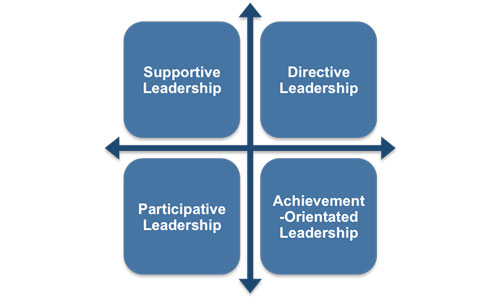
(Source: Path goal theory of leadership. 2017)
- Directive: In this, manager provide guidance and direction to inform employees about their goals and work effectively. For this, coordinating and scheduling are two functions which are organised by manager of A David & Co Limited. It will assist supervisor to direct group members and overcome with complexities and uncertainties from workers functioning.
- Supportive:This is very important that manager assign activities that workers need to accomplish in an effective way. It is efficient within enterprise which comprises challenging activities and physical work (Solomon and et. al., 2017). In A David & Co Ltd, manager group members are having support of top authority in order to accomplish their task properly. It will assist worker to perform work and deliver fresh and quality of products to their customers.
- Participative: For making proper decisions and reduce employee resistivity, managers of A David & Co Ltd involve participation of workers in decision-making activity. It helps them in getting support of workers as well as analyse different opinion and suggestion through which proper decision can be taken. In addition to this, it also aid organisation in obtaining high commitment and contribution of employees in achievement of business objectives.
- Achievement: Forachievement of business objectives, superior of A David & Co Ltd. used to construct more challenging task for team members. The purpose behind this is to increase capability of team-members and make them more capable to face future challenges in better way (Wilkinson and et. al., 2014).
Conclusion
As per above report it has been concluded that the behaviour as well as performance of teams and individual are depend on higher authorities. It is important that power, culture and politics are tactics which gave influence on management functioning and acknowledge of employees. Here, management is using Maslow hierarchical need theory within their business activities in order to motivate their employee. It will assist in increasing higher level of productivity and profits. Manager of organisation also build effective team in order to accomplish business goals and objectives within given period of time. For this, they are taking help of Tuckman's team development model. Along with this, Belbin's model is also used by leaders to gain knowledge about roles of teams. It will assist them to give quality of goods and services to their buyers in order to sustain firm position within marketplace.
If you find yourself in need organisational behavior assignment help, reach out to Assignment Desk -the best assignment writing service provider in UK.
Get exclusive discounts and offers by consulting with us regarding your assignment. Subject experts associated with Assignment Desk are art your disposal round the clock.
References
- Bedarkar, M. and Pandita, D., 2014. A study on the drivers of employee engagement impacting employee performance. Procedia-Social and Behavioral Sciences. 133. pp.106-115.
- Boxall, P., Guthrie, J. P. and Paauwe, J., 2016. Editorial introduction: Progressing our understanding of the mediating variables linking HRM, employee wellbeing and organisational performance. Human Resource Management Journal. 26(2). pp.103-111.
- Burrell, G. and Morgan, G., 2017. Sociological paradigms and organisational analysis: Elements of the sociology of corporate life. Routledge.
- Christina, S. and et. al., 2014. How organisational behaviour and attitudes can impact building energy use in the UK retail environment: a theoretical framework. Architectural Engineering and Design Management. 10(1-2). pp.164-179.
- Coccia, M., 2014. Structure and organisational behaviour of public research institutions under unstable growth of human resources. International Journal of Services Technology and Management. 20(4-6). pp.251-266.
- Gabriel, A. S. and et. al., 2015. Emotional labor actors: A latent profile analysis of emotional labor strategies. Journal of Applied Psychology. 100(3). p.863.
- Hashim, J. and Wok, S., 2014. Predictors to employees with disabilities’ organisational behaviour and involvement in employment. Equality, Diversity and Inclusion: An International Journal. 33(2). pp.193-209.
- Kinicki, A. and et. al., 2014. Management: A practical introduction. McGraw-Hill Education Australia.



 Company
Company













